International Selection Committee
The International Selection Committee consists of internationally renowned nature conservationists. The committee selects candidates for the Future for Nature Award and proposes winners to the board.
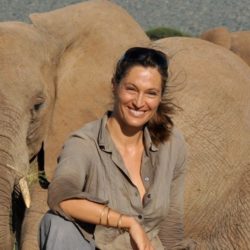
Saba Douglas-Hamilton is an award-winning wildlife filmmaker, TV host, and conservationist. As Chair of Future For Nature’s International Selection Com [...]
Saba Douglas-Hamilton is an award-winning wildlife filmmaker, TV host, and conservationist. As Chair of Future For Nature’s International Selection Committee, she believes passionately in promoting young conservation leaders and securing a future for the wild world. Her life in Africa, and her work as a wildlife filmmaker, has led her to some of the remoter parts of the planet where she has observed rare and endangered species in their natural habitats and experienced the frontline of conservation first hand.
In 2000 Saba was talent-spotted by the BBC Natural History Unit and began her career as a wildlife filmmaker, hosting nine TV series including Secret Life of Elephants, Big Cat Diary and Unknown Africa, and over twenty-four wildlife documentaries. She directed two award-winning films for Animal Planet, Heart of a Lioness and Rhino Nights, which documented previously unknown behaviour for the first time.
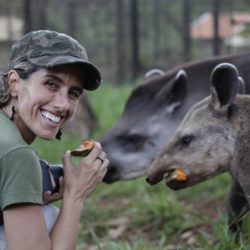
Patrícia Medici was one of the first winners of the Future For Nature Award in 2008. She won the Award for her outstanding conservation work on tapirs [...]
Patrícia Medici was one of the first winners of the Future For Nature Award in 2008. She won the Award for her outstanding conservation work on tapirs in Brazil. This enabled her to take a critical step towards establishing the Lowland Tapir Conservation Initiative. Since May 2013 she is part of the FFN committee.
For the past 20 years, Patrícia has been working for Instituto de Pesquisas Ecológicas, a Brazilian NGO, of which she was one of the founding members. Since 1996 she has been coordinating the Atlantic Forest Tapir Program in Brazil. In 2000 she was made chair of the IUCN Species Survival Commission’s Tapir Specialist Group (TSG), a network of over 100 tapir conservationists from 27 different countries worldwide. In 2008, Patrícia launched the Brazil-wide Lowland Tapir Conservation Initiative (LTCI), which aims to establish tapir conservation programmes in other Brazilian biomes where the species occurs.
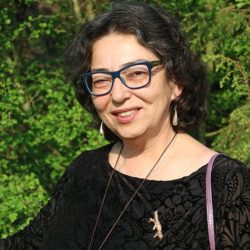
Masha established the International Fund for Animal Welfare’s office in the Russian Federation in 1994, then initiated a campaign which led to a ban on [...]
Masha established the International Fund for Animal Welfare’s office in the Russian Federation in 1994, then initiated a campaign which led to a ban on the winter den hunt of hibernating bears. She helped expand the Orphan Bear Cub Rehabilitation Centre, which has rescued, rehabilitated and released more than 170 orphan bear cubs back to the wild.
Masha has also led campaigns resulting in the ban on the White Sea whitecoat harp seal hunt and the Sea of Okhotsk beluga hunt, as well as working to increase the penalties for poaching of tigers and several other endangered species listed in the Red Book of Russia. As part of the efforts by the International Fund for Animal Welfare (IFAW) to save the critically endangered western grey whale, Masha’s team helped ensure that offshore oil and gas pipelines were constructed around, rather than through, crucial feeding grounds near Sakhalin Island.
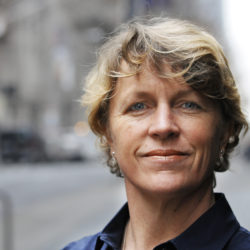
Annette Lanjouw is Vice-President for Strategic Initiatives and the Great Apes Program for the Arcus Foundation. In this capacity, Annette leads the wo [...]
Annette Lanjouw is Vice-President for Strategic Initiatives and the Great Apes Program for the Arcus Foundation. In this capacity, Annette leads the work to ensure respect for and the survival of great apes and their natural habitat across their range in Africa and South-East Asia. The Arcus Foundation is the largest private funder of great ape conservation and sanctuaries in the world.
Annette served as the regional director for Africa and Latin America at Fauna & Flora International, and as international programme officer for the Howard G. Buffett Foundation. From 1993 to 2005, Annette was director of the International Gorilla Conservation Programme (IGCP), a partnership between the Worldwide Fund for Nature, African Wildlife Foundation and Fauna & Flora International, which has successfully worked to conserve and develop a supportive institutional and policy environment for integrated conservation in Central and East Africa. From 1990 to 1993, Annette was the programme coordinator for the Wildlife Conservation Society (WCS) Protected Area Regional Conservation Strategy across Central Africa.
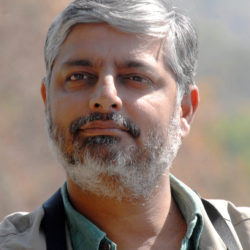
Vivek Menon is an award-winning wildlife conservationist, environmental commentator, author and photographer with a passion for elephants. He is the fo [...]
Vivek Menon is an award-winning wildlife conservationist, environmental commentator, author and photographer with a passion for elephants. He is the founder and executive director of the Wildlife Trust of India (WTI), the regional director and adviser to the International Fund for Animal Welfare (IFAW), a member of the Species Survival Commission of the IUCN, an adviser to the Marjan Centre at Kings College London and a board member of Minding Animals International.
In India, he is a member of the Advisory Council of the CII-ITC Centre of Excellence for Sustainable Development, a member of four State Advisory Boards for Wildlife, and an Honorary Wildlife Warden of Delhi. He is also a member of the Indian Working Group of the Advisory Committee on World Heritage Matters, the National Project Steering Committee – Strengthening Regional Cooperation in Wildlife Protection in Asia, and the Project Elephant Steering Committee.
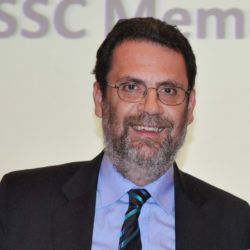
Simon Stuart is serving his second four-year term as chair of the IUCN Species Survival Commission. In 2004 he completed the Global Amphibian Assessmen [...]
Simon Stuart is serving his second four-year term as chair of the IUCN Species Survival Commission. In 2004 he completed the Global Amphibian Assessment, which put the global phenomenon of amphibian declines and extinctions on the map. Simon’s involvement with Future For Nature stems from his commitment to raising up the next generation of conservation leaders.
Prior to his work for IUCN, Simon was the senior species scientist for both IUCN and Conservation International. From 1991 to 2000 he served as programme head of the IUCN Species Survival Commission, and from December 2000 to April 2001 as acting director-general of IUCN. Simon has undergraduate and doctoral degrees in conservation biology from the University of Cambridge.
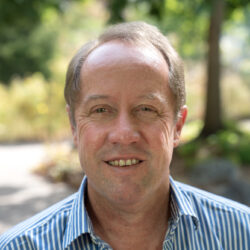
Hugh Possingham is an award-winning conservation scientist. He has published over 700 refereed research papers in the fields of applied ecology, popula [...]
Hugh Possingham is an award-winning conservation scientist. He has published over 700 refereed research papers in the fields of applied ecology, population dynamics and conservation biology. His diverse career brought him to work as an academic in various prestigious institutions such as Stanford University, Oxford University, Imperial College and The University of Queensland, where he supervised over 90 PhD students.
In 2016, Hugh became the Chief of Scientist of The Nature Conservancy. In this role he coordinated the organisation’s scientific efforts in protecting more than 40 million hectares of land and thousands of kilometres of rivers worldwide. Most recently he was the Chief Scientist of Queensland, Australia, where he provided high-level strategic science, research and innovation advice to the Queensland Government on all scientific issues.
Currently Hugh divides his time between multiple initiatives to protect biodiversity (e.g. the Biodiversity Council, BirdLife Australia, Great Barrier Reef Foundation, Adelaide University Environment Institute and Accounting for Nature), and his position as the chief scientist of Queensland, Australia, where he provides high-level strategic science, research and innovation advice to the Queensland Government.
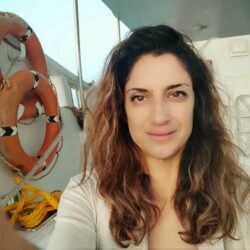
Patricia studied Zoology at Oxford University before pursuing a Master’s degree in Australia, where her work on the Great Barrier Reef and volunteering [...]
Patricia studied Zoology at Oxford University before pursuing a Master’s degree in Australia, where her work on the Great Barrier Reef and volunteering in a remote Aboriginal community in Cape York exposed her to the rich indigenous knowledge of the natural world. In Palau, Micronesia, she founded a non-profit organization, Community Centred Conservation (C3) (www.c-3.org.uk), dedicated to blending modern scientific research with traditional ecological wisdom to enhance the conservation of coastal and marine biodiversity.
Her work in marine conservation has spanned several countries, including the Philippines, Fiji, Comoros, Egypt, Saudi Arabia, Madagascar, and Mauritius. Patricia has been instrumental in raising awareness of endangered marine species such as dugongs, sea turtles, and sharks. In 2012, she was awarded the prestigious Future for Nature Award for her innovative approach to engaging communities in dugong conservation in Madagascar.
Patricia is a member of the IUCN Species Specialist Group (Sirenians) and served six years on the UK’s Darwin Expert Committee. She also serves as an advisory board member for the network of locally-led NGOs under C3 in the Philippines, Fiji, Madagascar, and the UK. As an independent consultant, she now provides expertise in areas such as species action plans, habitat restoration, and project management.
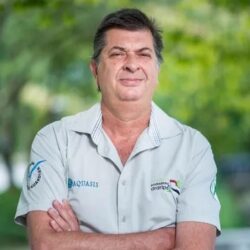
Alberto Campos is a conservation biologist who co-founded the NGO Aquasis while still an undergrad student, with the mission to prevent extinctions in [...]
Alberto Campos is a conservation biologist who co-founded the NGO Aquasis while still an undergrad student, with the mission to prevent extinctions in Brazil. For 20 years, he acted as the NGO’s principal Director, creating long-term conservation projects for some of the most globally endangered birds and marine mammals. He has received three Conservation Leadership Awards and the prestigious Future for Nature Award. The NGO Aquasis received the Brazilian National Biodiversity Award for downlisting critically endangered species in the Brazilian and IUCN red lists. In 2025, as one of the six finalists for the Indianapolis Prize, Alberto received the DeHaan prize, due to his long-term commitment to biodiversity conservation. He is now developing a network of large privately protected areas to promote rewilding and safeguard key habitats for endangered species.

